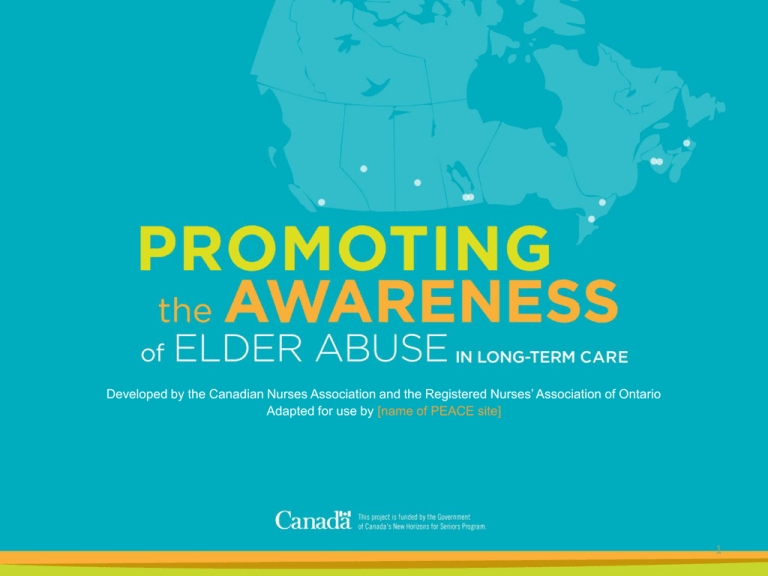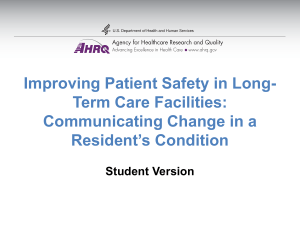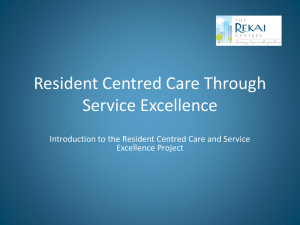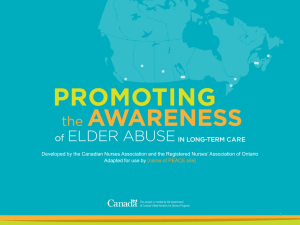module 4 - NurseONE.ca
advertisement

Developed by the Canadian Nurses Association and the Registered Nurses’ Association of Ontario Adapted for use by [name of PEACE site] 1 MODULE 4: INTERVENTION and STRATEGIES 2 Promoting Awareness of Elder Abuse in Long-Term Care Homes • Two-year national project between Canadian Nurses Association and the Registered Nurses’ Association of Ontario from April 2010 – March 2012 • A series of education sessions implemented in 10 PEACE Sites across Canada • Topics included are recognizing elder abuse; when and how to report elder abuse; how to intervene; and what you can do to prevent elder abuse • Resources and materials on NurseONE 3 What have we learned so far? Objectives By the end of this module, the learner will be able to: 1. Explain the de-escalation strategy as an immediate intervention 2. Discuss Next Step intervention strategies 3. Apply resident centred care and the therapeutic relationship as preventative strategies for elder abuse 5 Understanding Intervention • Definitions: – Intervene: To involve yourself in a situation with the intention of influencing the outcome – Intervention: The act of intervening • Each situation must be looked at with its own contributing factors and the individuals involved • Think about the needs and desires of the Resident • Team based, interprofessional approach 6 Immediate Intervention: De-escalation Defined here as: “Use of a phrase to break the flow of an abusive or potentially abusive situation” • It serves to alert the individual that the situation appears to be abusive and helps keep the Resident safe • Example: Can I help you? Can I see you for just a minute? 7 Alternate Exercise If you walked into this situation, what would you do/say to de-escalate: Example 1 Staff A goes by a resident’s room and sees a co-worker, Staff B, heaving a resident onto the bed. What should happen next? Should this be reported as abusive behaviour? 9 Example 1 Staff A enters the room to first ensure the resident is all right, then offers support to Staff B in order to break the abusive situation. Presuming the resident is all right, Staff A says to Staff B, “Can I help you?” or “Can I see you for just a minute?” 10 Example 2 Staff C passes by Staff D’s office and hears Staff D shouting at a resident. What should happen next? Should this be reported as abusive behaviour? 11 Example 2 Staff C enters the office and asks the resident if he or she was all right and does a quick assessment to determine if the resident is in danger. Then Staff C asks Staff D “Can I see you for a minute?” 12 Next Step Intervention • Does your long-term care setting have a zero tolerance for abuse? • Who must the incident(s) be reported to? • What internal supports can be drawn on? • What external supports exist in your community? 13 Strategy: Therapeutic Relationship • A therapeutic relationship requires reflective practice • Self-awareness • Self-knowledge • Empathy • Awareness of ethics • Boundaries and limits of the professional role • Show respect, talk to residents as you would like to be talked to. 14 Strategy: Resident Centred Care •Respect for residents •Residents deserve to be treated with dignity •Residents are experts on their own lives •Residents are leaders (they can help us as we provide care) •Residents’ goals should coordinate the way that the health care team provides care •Residents deserve continuity and consistency of care and caregiver •Resident care should be timely and responsive •Residents deserve fair/proper access to care they need 15 Strategy: Interacting with the Resident •Resident focused •Respectful •Provided with dignity •Your behaviour may help you give better care to residents •Quality talking is a good way to reduce or prevent elder abuse 16 Case Scenario Comparisons • Scenario 1 Resident Mrs. E seeks out resident Mr. F to sit with him and hold his hand. Mr. F greets her warmly and ensures there is room for her to sit beside him. • Scenario 2 Resident Mrs. E seeks out resident Mr. F to sit with him and hold his hand. Mr. F pushes her away and shouts for staff to intervene. 17 Optional Case Study An 80 yr old female resident has had a long standing intimate relationship with a younger man. This relationship started prior to her admission to LTC. The relationship was primarily sexual in motivation with consent Resident was cognitively intact and told staff to “mind your own business” when asked about visits As time passed, the resident’s condition deteriorated and staff noticed that she was more confused and withdrawn after his visits How would you explore this resident’s rights and wishes? 18 Key Points • Establish a word or phrase to use in situations that may appear to be abusive • Consider appropriate Next Step interventions • Using resident centred care values, beliefs and therapeutic relationships may help prevent elder abuse from occurring 19 Questions? Resources 21 What’s Next? • • • • Module 1: Understanding Elder Abuse Module 2: Recognizing Elder Abuse Module 3: Learning the Law Module 4: Strategies and Interventions Module 5: Healthy Work Environments 22







